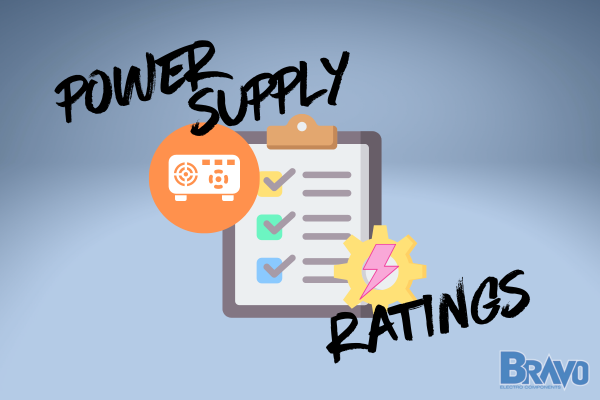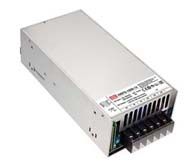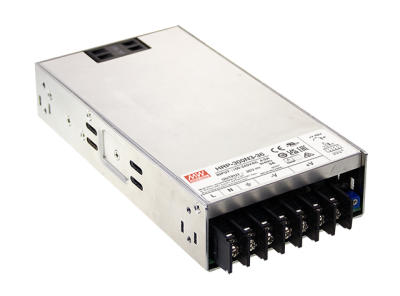
Welcome to the Bravo Electro blog! Today, we'll be discussing an essential topic for any design engineer or professional: How are power supplies rated? To choose an appropriate power supply, it's important to have a good understanding of different ratings and specifications.
This will help you make informed decisions based on your specific requirements.
In our discussion, we will address efficiency, voltage, and safety standards. Additionally, we will provide several suggestions on how to choose the ideal power supply for your specific requirements.
So, let's dive in and learn more about power supply specifications!
How are Power Supplies Rated?
So how are power supplies rated? This section will discuss the important ratings and specifications to consider for power supplies. These ratings can be categorized as follows:
Power & Efficiency Ratings
A power supply's efficiency rating is a crucial factor in determining its performance. The power supply efficiency rating indicates how well it converts the input power (usually from your home's electricity) into the necessary output power for your equipment. A greater efficiency rating indicates less energy waste and lower operational expenses.
To gauge a power supply's efficiency, you should assess its efficiency curve which depicts how its efficiency varies with different loads. It's preferable to settle for a power supply with higher efficiency and a vast range of load accommodations for optimal performance in versatile situations.
Moreover, particular power supplies meet specific efficiency regulations, like the 80 PLUS certification, signifying an efficiency level of 80% or more at different load conditions.
Input Voltage & Frequency Ratings
Understanding whether a power supply uses AC or DC input voltage is vital when selecting the right device for your needs.
So, is household electricity AC or DC? In most cases, household electricity usually runs on alternating current (AC), but a lot of electronic devices need direct current (DC) to work correctly. That is why a power supply is important - it changes the AC voltage to the DC voltage that your equipment needs.
The input voltage rating for power supplies can change according to the design and planned usage of the power supply.
Some power supplies are made for use in specific countries, so their input voltage ratings match those countries' electricity grids. Universal input power supplies, on the other hand, can accept a wide range of input voltages and work in different countries.
The input frequency rating of a power supply is essential to consider as well. Most household electricity runs at 50 or 60 Hz, depending on the location. Some power supplies can work with specific input frequencies, while others can work with a range of frequencies.
Output Voltage Regulation & Ripple Ratings
The output voltage regulation rating reflects how steady a power supply's output voltage remains when the load conditions are variable.
When dealing with sensitive electronics, a low ripple rating is crucial since it suggests fewer fluctuations in the output voltage. The percentage indicates the output voltage regulation, with the lower percentages meaning better regulation.
Another important aspect to consider is ripple in assessing a power supply's performance. Ripple refers to small, high-frequency deviations in a power supply's output voltage. The excessive ripple could damage electronic components or destabilize them.
Ripple is generally measured in millivolts peak-to-peak (mVpp) and should be kept as low as feasible for optimum performance.
Temperature & Environmental Ratings
The suitability of a power supply for various applications depends on its temperature and environmental ratings, which cover factors such as its operating temperature range, humidity tolerance, and resistance to vibration or shock.
The power supply's operating temperature range is a crucial factor since it can affect its performance and longevity. A power supply that operates within a wide temperature range can handle harsher conditions and is more durable, making it critical in industrial or outdoor settings where temperature conditions can be extreme.
Humidity tolerance is another essential environmental rating to consider. Power supplies in high-humidity settings require moisture protection to prevent damage to the internal components. Some power supplies have conformal coatings to safeguard against moisture, dust, and other pollutants.
When using power supplies in rough contexts such as the military or aerospace, shock and vibration durability is also a critical consideration. Certain power supplies are designed to resist high levels of shock and vibration, ensuring dependable and consistent operation even in harsh circumstances.
Safety Standards & Certifications
Safety standards and certifications, such as UL listed power supplies, are crucial when evaluating power supply quality. They indicate that a power supply has been tested and meets specific safety and performance requirements.
Class 1 vs class 2 power supply is another factor to be aware of. Power supplies can be classified as either Class 1 or Class 2. Class 1 power supplies necessitate a safety ground connection, while Class 2 power supplies need greater safety standards and do not require a ground connection.
Isolated power supplies employ transformers to isolate the input and output circuits, ensuring added safety and reducing the risk of electrical shock. Non-isolated power supplies, in contrast, lack this insulation and are therefore less suited for safety-critical applications.
Aside from safety certifications, you may also come across performance certifications like Energy Star or 80 PLUS, which are concerned with energy efficiency and environmental performance.
Tips for Choosing the Right Power Supply Ratings for Your Unique Use Case
Now that we've answered "How are power supplies rated?", let's discuss how you can select the perfect power supply for your specific needs.
Understand the Requirements of Your System
So what type of power supply do I need? The first step in choosing the right power supply is understanding the requirements of your system.
This includes determining the necessary power supply voltage, current, and wattage, as well as any specific power supply sizes or form factors. To ensure that your system operates reliably and efficiently, it is important to carefully evaluate its power requirements before choosing a power supply.
Identify Key Parameters & Features That Matter to You
Do you need a modular power supply for easy customization? Are you looking for a specific power supply lifespan?
By taking these aspects into consideration, you can identify the ideal power supply for your particular needs. Suppose you are constructing a custom PC, in that case, you may want to choose a modular power supply that offers improved cable management and a more polished appearance inside the case.
Moreover, examine any unique features or technology that might be important for your specific application. For instance, if you are operating with fragile electronic components, you will need a power supply that has outstanding output voltage regulation and minimal ripple.
Head Over to Bravo Electro & Get the Perfect Power Supply!
At Bravo Electro, we are dedicated to delivering outstanding customer support.
Our representatives are highly experienced in this field, and we specialize in providing high-quality power supply sourcing and custom project assistance. We offer free samples to help you find the perfect power supply for your needs.
Additionally, we provide same-day shipping and competitive pricing, making us the easy choice for your power supply needs.
Some of our popular products include:
So, who makes the best power supplies? Bravo Electro collaborates exclusively with manufacturers who are certified and committed to ensuring the quality of their products. We will happily assist you in locating the perfect power supply that matches your specific needs.
Closing Thoughts on How Power Supplies Are Rated
To choose the appropriate power supply for your specific requirements, it is vital to comprehend how power supplies are evaluated.
By studying the various ratings and specifications such as efficiency, input and output voltage, temperature and environmental ratings, and safety standards, you will be better prepared to make informed decisions about power supply selection.
Also, by considering the distinctive requirements of your system and recognizing the essential parameters and features that matter to you, you can ensure that the power supply you pick offers consistent and efficient performance.
At Bravo Electro, we are committed to helping you find the perfect power supply. With our vast selection of high-quality power supplies and outstanding customer support, you can trust us to help you find the ideal solution that suits your specific needs.
Remember to always consider the power supply specifications and features that are important to your specific use case, and never hesitate to reach out to our knowledgeable team for assistance.
And while you're here, check out some of our other posts on topics like signs of a bad power supply, isolated vs non isolated power supply, and AC vs DC power supply.








